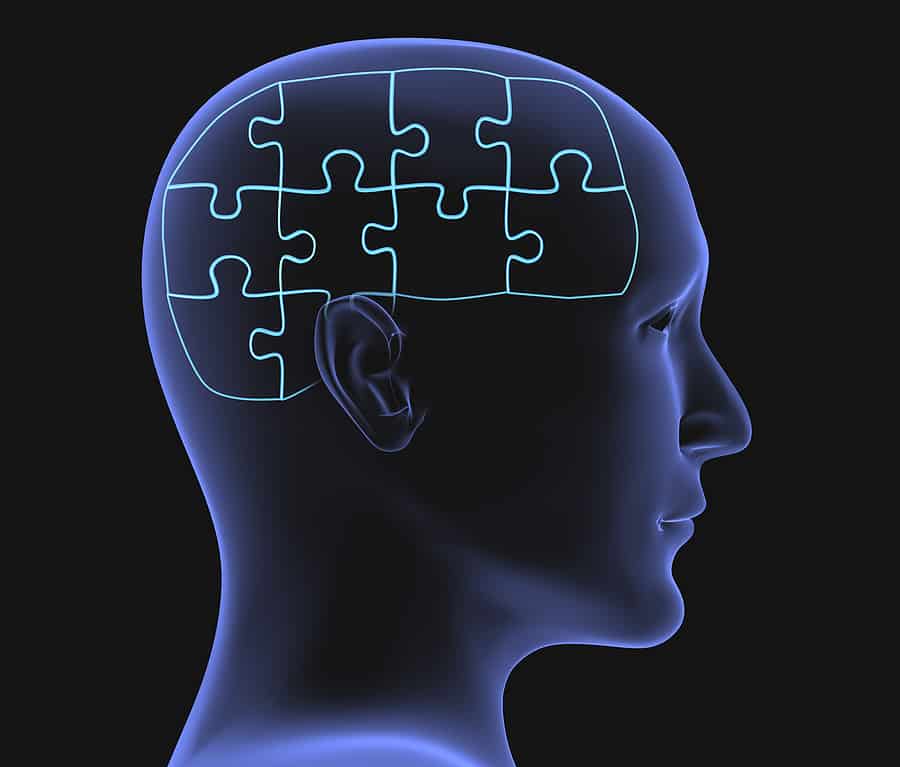Last Updated on February 14, 2024 by JigsawPuzzleGuru
Jigsaw puzzles are a lot of fun – solo or with others. Assembling, or tiling, the puzzle together takes time and patience. You’ll also need to use critical thinking skills to quickly put pieces together. But are jigsaw puzzles good for your brain? Can you light up your brain with jigsaw puzzles? Let’s find out.

Table of Contents
Are Jigsaw Puzzles Good for Your Brain? What Science Has to Say
Jigsaw puzzles are a great way to pass the time when you’re stuck in the house or it’s raining outside. And these puzzles can be highly addicting, too. Some people find that solving jigsaw puzzles help them relax or connect with others more.
Studies have been done on jigsaw puzzles that investigate their brain-related benefits.
2018 Study by Frontiers in Aging Neuroscience
A 2018 study sheds a lot of light on what’s happening in the brain when you’re piecing puzzles together. The study is interesting because it linked multiple benefits of puzzles together, finding that jigsaw puzzles may help:
- Recruit visuospatial cognitive abilities
- Protect against visuospatial cognitive aging
The researchers concluded that larger studies need to be conducted to determine the long-term benefits of puzzling on the brain. Interestingly, researchers from the study suggest that high puzzling of 9,100 connected pieces or more may also have cognitive benefits.
2017 Study on Cognitive Enhancement
A 2017 study tried to determine if solving jigsaw puzzles helped with cognitive enhancement in people 50 years of age and older. The study included 100 cognitively healthy adults that were all engaged in solving jigsaw puzzles over 30 days.
The participants were found to have an improvement in visuospatial function.
Again, researchers claim that improvement and/or the delay in cognitive impairment will require a more extensive study.
2021 Study on 2 – 4-Year-Old Children
Puzzles can be enjoyed at almost any age, and a 2012 study was conducted on children by the University of Chicago to determine whether puzzles offer cognitive benefits. Researchers found that children who engaged in puzzles between the ages of 2 and 4 had the spatial skills of children that were 4 1/2 years of age or older.
Spatial skills play an important role in:
- Mathematics
- Technology
- Science
Children that played with puzzles also showed better overall ability when trying to translate and rotate shapes.
So, studies do show that jigsaw puzzles can improve visuospatial function, but there needs to be further research into long-term cognitive benefits. There is a lot of anecdotal evidence that suggests jigsaw puzzles have a lot of brain-related benefits.
4 Benefits of The Jigsaw Puzzle
1. Visual-Spatial Benefits
Puzzling can help improve spatial reasoning, allowing you to see the “big picture” when doing a puzzle.
2. Mental Stimulation
Puzzles work both the right and left sides of the brain. When you engage these areas of the brain, you can benefit from intuitive thinking, logic improvements, a boost in creativity, and even cognitive function increases.
3. Attention
Focusing on puzzling helps you pay close attention to detail and to analyze situations more deeply. You’ll learn how to spot differences in shapes, colors, and patterns.
4. Memory Improvement
Mental speed and thought process improvement is achieved when solving puzzles. You have to remember where pieces go, their shapes, and where you remember seeing certain puzzle patterns.
Conclusion
Are Jigsaw Puzzles Good For Your Brain? 3 Studies Say “Yes!”
As you put the pieces of a puzzle together, you’ll start creating mental maps of your progress and which pieces still need to be put together.
Jigsaw puzzles help you pass the time faster, work both sides of the brain, and can offer cognitive benefits, too. If you want to engage in a fun hobby that is good for your brain, the jigsaw puzzle is a good choice.
Want to read more? Check out 9 Benefits of Working a Daily Jigsaw Puzzle




